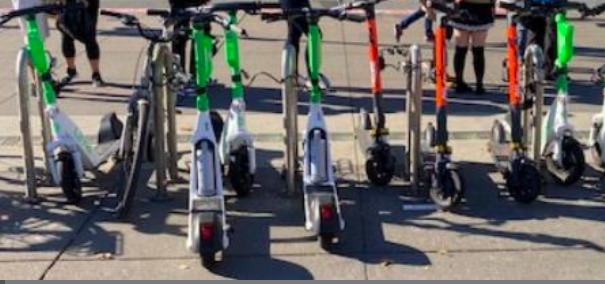San Francisco completely failed to regulate Uber and Lyft when they burst on the scene, devastating the taxi industry and the lives of hundreds of mostly immigrant drivers.
It was an example of how this city has been far behind the curve on regulating new technology that impacts residents. And we got a sense today of how the Municipal Transportation Agency is still slipping when it comes to dealing with some 5,500 battery-powered scooters that have permits to operate on city streets.

At a Land Use and Transportation Committee hearing, we learned, among other things, that the scooters can be a health hazard, both to drivers and pedestrians.
A report by the Department of Public Health, tracking only admissions to SF General Hospital, notes:
Year 2020 data show five severe (requiring hospital admission) e-scooter related injuries, and of these four were critical injuries. These data do not include fatal injuries: for the first time in 2020 two riders of e-scooters died in San Francisco. Taken together, these data indicate this emerging mode may be particularly vulnerable to traffic injury.
The numbers are almost certainly much higher.
As Sup. Aaron Peskin noted at the hearing, Nichole Bohn, the director of the Mayor’s Office of Disability, was struck outside of City Hall by a scooter driver who was on the sidewalk, which is illegal. She was in her wheelchair and her ankle was shattered; Peskin said she will require months of hospitalization and recovery.
“The SFMTA argued that all transportation was good transportation,” and approve the scooter program, Peskin said—and now, he said, it’s time to make sure the companies that operate these motorized vehicles actually follow the rules.
Kate Toran, director of taxis, access, and disability services at the SFMTA, said that the city has plenty of reports of “riders breaking the rules, riding and sidewalks, double riding.”
The rules say no riding on the sidewalk; every one of the three companies who have contracts with SF—Scoot, Spin, and Lime—already have the technology to track riders who are on sidewalks and potentially slow or halt their progress. They can also disconnect the accounts of rogue riders.
But evidence at the hearing made clear some serious problems:
The SFMTA has no consistent guidelines on how to deal with riders who flout the rules; that’s up to the companies, and each one has different policies. That can encourage riders to simply move from one platform to another if they are dinged for violations.
A grand total of 83 riders, out of the many thousands who use the services, have lost their accounts for violating the rules—and in the case of Scoot, only three riders have been banned.
In most cases, people who ride on the sidewalk or park the scooters in a way that blocks a sidewalk get a warning, then a “fine” of $5 or $10.
The SFMTA has a policy of asking the companies to figure out how to solve these problems instead of setting firm rules. “The next generation of enforcement is up to the companies,” Sup. Myrna Melgar noted.
Representatives of the companies and the SFMTA said that scooters parked in violation of the rules have to be removed within two hours. But that, Peskin said, doesn’t always happen.
“A bunch of these things get thrown into the Bay,” he said. “You can see them at low tide, and it takes weeks for the companies to fish them out. There’s battery acid going into the Bay, and I don’t like it, and the fish I swim with don’t like it either.”
The vast majority of the scooter rides are in Soma and downtown. The companies argue that they are a great way to give people the “last mile” after transit, getting riders out of their cars.
And in some cases, maybe many cases, that may be true.
But then you have the folks who, as Peskin noted, come into the city as tourist and “joy ride” along the Embarcadero, causing pedestrians to scatter—and they won’t be back for months, if ever, and don’t care if their accounts are closed.
Peskin’s proposal is that the SFMTA stop issuing any new permits for powered scooters until the three companies demonstrate that they have implemented existing technology to keep the riders off the sidewalks.
But the supes can only recommend policy; the final decision is up the the SFMTA.






